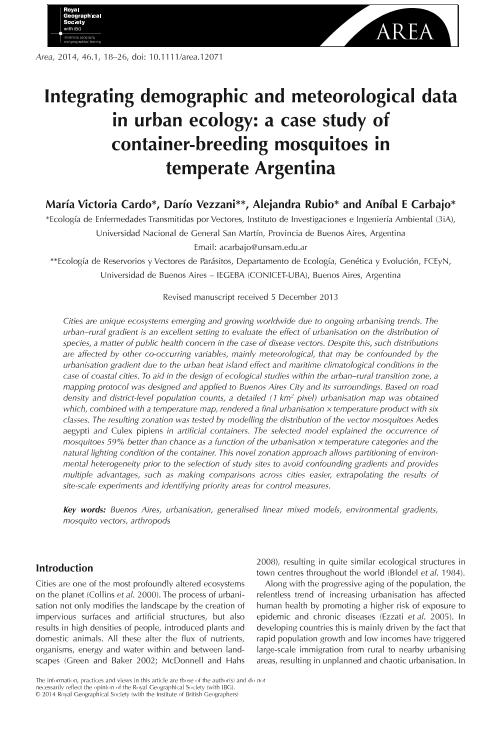Artículo
Integrating demographic and meteorological data in urban ecology: a case study of container-breeding mosquitoes in temperate Argentina
Fecha de publicación:
02/2014
Editorial:
Wiley
Revista:
Area
ISSN:
1475-4762
Idioma:
Inglés
Tipo de recurso:
Artículo publicado
Clasificación temática:
Resumen
Cities are unique ecosystems emerging and growing worldwide due to ongoing urbanising trends. The urban–rural gradient is an excellent setting to evaluate the effect of urbanisation on the distribution of species, a matter of public health concern in the case of disease vectors. Despite this, such distributions are affected by other co-occurring variables, mainly meteorological, that may be confounded by the urbanisation gradient due to the urban heat island effect and maritime climatological conditions in the case of coastal cities. To aid in the design of ecological studies within the urban–rural transition zone, a mapping protocol was designed and applied to Buenos Aires City and its surroundings. Based on road density and district-level population counts, a detailed (1 km2 pixel) urbanisation map was obtained which, combined with a temperature map, rendered a final urbanisation × temperature product with six classes. The resulting zonation was tested by modelling the distribution of the vector mosquitoes Aedes aegypti and Culex pipiens in artificial containers. The selected model explained the occurrence of mosquitoes 59% better than chance as a function of the urbanisation × temperature categories and the natural lighting condition of the container. This novel zonation approach allows partitioning of environmental heterogeneity prior to the selection of study sites to avoid confounding gradients and provides multiple advantages, such as making comparisons across cities easier, extrapolating the results of site-scale experiments and identifying priority areas for control measures.
Archivos asociados
Licencia
Identificadores
Colecciones
Articulos(IEGEBA)
Articulos de INSTITUTO DE ECOLOGIA, GENETICA Y EVOLUCION DE BS. AS
Articulos de INSTITUTO DE ECOLOGIA, GENETICA Y EVOLUCION DE BS. AS
Articulos(SEDE CENTRAL)
Articulos de SEDE CENTRAL
Articulos de SEDE CENTRAL
Citación
Carbajo, Anibal Eduardo; Rubio, Alejandra; Vezzani, Dario; Cardo, María Victoria; Integrating demographic and meteorological data in urban ecology: a case study of container-breeding mosquitoes in temperate Argentina; Wiley; Area; 46; 1; 2-2014; 18-26
Compartir
Altmétricas




